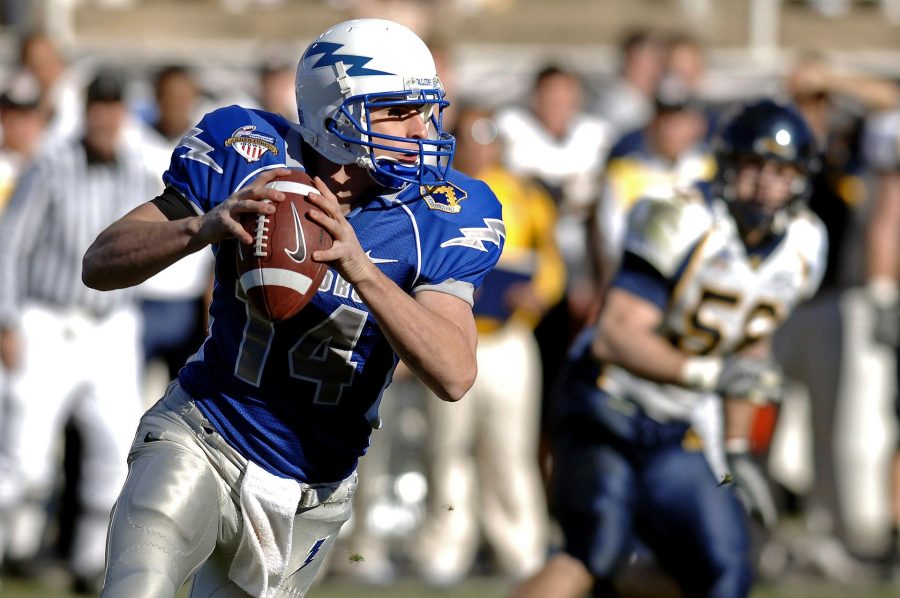It’s January, and the cold air causes students to see their breath in front of them and feel their hands crack at their sides. Running track in single–digit weather might seem unusual to the general population, but to people who love the sport… well, it’s not ideal, but it’s worth it. For students like those on Viterbo’s track and field team, which just placed third in conference championships for the NAIA, this is an integral part of their college experience and for many has been part of their lives since middle school or earlier.
On the flip side of the excitement and joy felt by the victorious Viterbo track and field teams, the same month saw a much different scene in the conversation of track and field in Montana. Students there seemed unsettled, angered, and threatened as they gathered in front of the Montana state capitol on Monday, April 19, to protest a piece of legislation attempting to ban transgender athletes from high school and college sports programs under their identified gender.
The bill is not unprecedented. This concept originated in Mississippi and was quickly followed in the states of Arkansas and Tennessee. Montana would become the fourth state to put such a ban in place if the law goes through (although Idaho unsuccessfully attempted to enact a policy last year, which would bring the total to five states). Proponents of the policy say it will level the playing field for students assigned female at birth, but the question must be raised: who is truly benefited by a policy that creates a more exclusive gender environment in sports?
One thing can be said for certain: transgender bans in sports are bad for sports programs. According to an article from American Progress, “In states with [transgender] inclusive policies high school girls’ participation in sports remained unchanged from 2011 to 2019. In states with exclusive policies, girls’ participation has decreased.” And while many would point out the fact that clearly programs would suffer the loss of transgender athletes, it is important to note that a fair number of allies to the LGBTQ+ community would be likely to refrain from sports as well, or move to participate in other programs with more inclusive policies. Additionally, the NCAA has made clear it will bar states that have anti transgender legislation in place from holding championship games or events.
Discussing the mental and physical wellbeing of the students directly affected by the policies, which lawmakers often forego when putting the policy up for a vote, brings us to another sobering dimension of this debate. Overwhelmingly unsupported as a group in high school and college settings, almost 44 percent of transgender youth reported having considered suicide in the past year, in contrast to the 16 percent of cisgender youth. These numbers are even more sobering when transgender youth are actively not affirmed and recognized in an organized fashion. Additionally, 28 percent of transgender youth whose pronouns were not recognized or affirmed attempted suicide in the past year, in contrast to a still sobering if somewhat less–frightening 12 percent of transgender youth whose pronouns were recognized.
Everything from the NFL’s Play 60 program to the rapid rise in virtual workout programs is proof enough that physical exercise is integral to both the physical and mental health of everyone. Students turned away from sports are far less likely to participate in physical exercise and therefore are far less likely to reap the variety of health benefits.
It would be not only unwise but poorly principled to write on this topic without addressing the concerns of those raising legislation to remove transgender athletes from sports teams. Does allowing transgender athletes, particularly transgender women, to compete in sports allow an unfair competitive advantage due to the natural biological abilities of individuals born male? When testifying against a North Dakota piece of legislation slated to remove transgender women from sports, the North Dakota American Academy of Pediatricians shared that “in 2017 a systemic review of medical literature found ‘There is no direct or consistent research suggesting transgender female individuals (or male individuals) have an athletic advantage at any stage of their transition (e.g. cross-sex hormones, gender-confirming surgery).“ It is interesting to note that the Olympics has allowed trans men and women to compete for 17 years and has yet to see a transgender athlete take home a gold medal. Additionally, the NCAA has ruled in favor of transgender athletes competing and we have yet to see trans athletes overrun this sport.
Dr. Timothy Roberts, fellowship director of the adolescent medicine fellowship at Children’s Mercy Kansas City, has spent a significant amount of time studying what level of advantage trans athletes may have over their cisgender competitors. After examining medical records and fitness test results of not only athletes but also of Air Force members, Roberts discovered, “for transgender women, their advantage starts to decline soon as they start to take testosterone blockers [and] is gone by two years.” This decline in advantage is even steeper for younger athletes. Roberts added,“ for adolescents who’ve gone through puberty… the playing field will have been leveled after a year.”
On the surface, the fear of transgender athletes in sports makes sense. But when the science and economic impact is factored in, it begins to be clear that not only is the erasure of transgender athletes unnecessary, it is downright dangerous to the individuals and the teams they participate on. It seems there is very little that could be worse for collegiate and high school level sports than to ban transgender athletes from competing.


